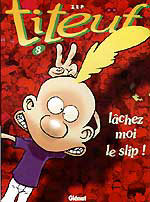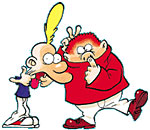>> Beyond Borders: Mondo Loco
>> Beyond Borders: Every Picture Tells A Story
More...

One million, four hundred thousand copies. Read that figure again. More than one thousand million copies printed and climbing. And I'm not talking about the latest John Grisham potboiler here. I'm talking about a comic book. A 64-page hardcover that retails at 14 euros apiece. Do the maths, folks.
Yeah, OK, we're talking about the French market, comics sell loads there, blah, blah, blah. But that figure is still double that of the second best selling book in the chart, Van Hamme's LARGO WINCH. It's, let me repeat it again, almost one point five million copies sold of an original graphic novel (or whatever the acceptable term is to define it). And that's before you even get into the revenue from licensing deals. This is a book that has spawned a TV animation series, a best-selling Gameboy game, and enough merchandise to embarrass Gap Kids production.
 What am I talking about? A children's book called TITEUF.
What am I talking about? A children's book called TITEUF.
The reason for its success isn't really due to the quality of the book. Though it's excellent entertainment, TITEUF is not a masterpiece. It's fun, well-written slapstick, with nice cartoony art and enough sexual references to throw an American into a fit.
Yeah, you heard me. Sexual references. In a children's book. Don't look at me that way, blame the French.
The now millionaire author of this monster is Swiss illustrator Philippe Chapuis, who signs the comics as Zep, as a homage to Led Zeppelin. A true wunderkind, he was first published in Switzerland at the tender age of 14, and soon joined the ranks of the legendary children's magazine Spirou. From there, he published a number of children's albums such as KRADOK and LEON COQUILLARD, but wasn't until he moved to Paris and started pitching TITEUF to every editor in the industry that he made an impact.
And what an impact. French publisher Glénat decided to give the young creator a chance and published the first TITEUF in black and white. From those humble beginnings, and nine albums and a ton of merchandise later, TITEUF has become the biggest moneymaker in the French comics market.
 So what's the reason for the series' unbelievable success? It's all in how it manages to identify with its target market. TITEUF is one of the few children's comics that doesn't try to treat children like a group of dumb, asexual, out-of-reality aliens. The kids portrayed in the comic look and talk in ways that feel real to the audience. There's the big kid, focused on scoring and getting his hands on every nude magazine he can find; the nerd, with tons of gadgets; the shy kid, abused by his father; the love interest, of course; and Titeuf itself, a lovable scoundrel you'd adore to know, but who you'd also hate to have to raise.
So what's the reason for the series' unbelievable success? It's all in how it manages to identify with its target market. TITEUF is one of the few children's comics that doesn't try to treat children like a group of dumb, asexual, out-of-reality aliens. The kids portrayed in the comic look and talk in ways that feel real to the audience. There's the big kid, focused on scoring and getting his hands on every nude magazine he can find; the nerd, with tons of gadgets; the shy kid, abused by his father; the love interest, of course; and Titeuf itself, a lovable scoundrel you'd adore to know, but who you'd also hate to have to raise.
Even the adults, the stern teacher, Titeuf's parents (one of the team unemployed and yes, they talk about unemployment and its consequences in the comic), every character is portrayed realistically and intelligently. Sometimes, the slapstick of the book can seem a little tiring, with a palpable overuse of a few token gags. But no matter how repetitive it gets, the book still manages to make the reader laugh throughout. Mostly with sex gags. Sex gags delivered by ten-year-old kids. And, unlike SOUTH PARK, it's aimed at kids.
That sound you hear is Bible Belt Americans having heart strokes.
Because, though many don't seem to realise it, today's kids know an awful lot about sex. Actually, a lot of them know more about it than some adults. (No, not more than me, I'm an expert, I can prove it. But I digress. I'm talking about sex and ten year olds here. And I really hope the FBI reads the whole article before making any conclusions about that sentence.)
TITEUF delivers gags about condoms, dirty magazines, and what lies under girls' skirts, and nobody raises an eyebrow about it in France, because it's amazingly well done. It's presented in a way that is natural and unthreatening. These feel like real children talking about their problems and sharing their jokes. Zep talks to his young readers like a school buddy, or sometimes taking on the role of an older brother, delivering some long forgotten education-through-comedy which hey, works like magic! There's even been a TITEUF sexual advice handbook produced for children, LA GUIA SEXUAL DE TITEUF.
 Ever since I first read TITEUF, and every time a publisher has tried to sell me a new comic line as a "way to regain the children's market", I can't help but laugh. Nowadays, comic pros think making a comic child-friendly means changing the character's clothes to the latest pages from this season's catalogue and using what they think is the newest slang. Meanwhile, the kids don't read comics anymore because they can't empathize with some fake teens brainstormed by a bunch of forty-year-olds in an expensive office in Manhattan. The so-called "loss of the children's market" is not real. The children's market is still there, but the industry keeps flooding the shelves with products that miss the market by a mile, as evidenced by Marvel's recent Tsunami line.
Ever since I first read TITEUF, and every time a publisher has tried to sell me a new comic line as a "way to regain the children's market", I can't help but laugh. Nowadays, comic pros think making a comic child-friendly means changing the character's clothes to the latest pages from this season's catalogue and using what they think is the newest slang. Meanwhile, the kids don't read comics anymore because they can't empathize with some fake teens brainstormed by a bunch of forty-year-olds in an expensive office in Manhattan. The so-called "loss of the children's market" is not real. The children's market is still there, but the industry keeps flooding the shelves with products that miss the market by a mile, as evidenced by Marvel's recent Tsunami line.
The simple problem with books like the Tsunami range is that their target audiences are not interested in what these books want to tell them, or in how they want to tell it. TITEUF's format - one page, one gag-focused strips - fits perfectly in a child-oriented magazine, and its compilations, in European album format, easily spotted on the shelves of France's local libraries, are the perfect size and length for children to enjoy. Add the incredibly fun content, well crafted, and always written and drawn with the target audience in mind, and the reason for TITEUF's success is no secret. It's definitely not a comic that's been toned for the sake of younger audiences, and it's the perfect vehicle to introduce children to a lifelong interest in bande desinée.
If any of today's publishers looking to crack the children's market are interested in seeing how it's really done, I'd recommend picking up one of the nine albums published thus far by Glénat, or the hilarious GUIA SEXUAL, especially good for parents scared by their children's hormonal uprising. There's also the magazine Tchô, spawned by the success of TITEUF and continuing to feature the strip alongside other children-friendly series such as 'Raghnarok', 'Smax', and 'Franky Snow', created by authors including Eric Buche, Christophe Bertschy and Boulet. For more information on TITUEF, you can visit the official website. I can guarantee you some laughs.

This article is Ideological Freeware. The author grants permission for its reproduction and redistribution by private individuals on condition that the author and source of the article are clearly shown, no charge is made, and the whole article is reproduced intact, including this notice.


